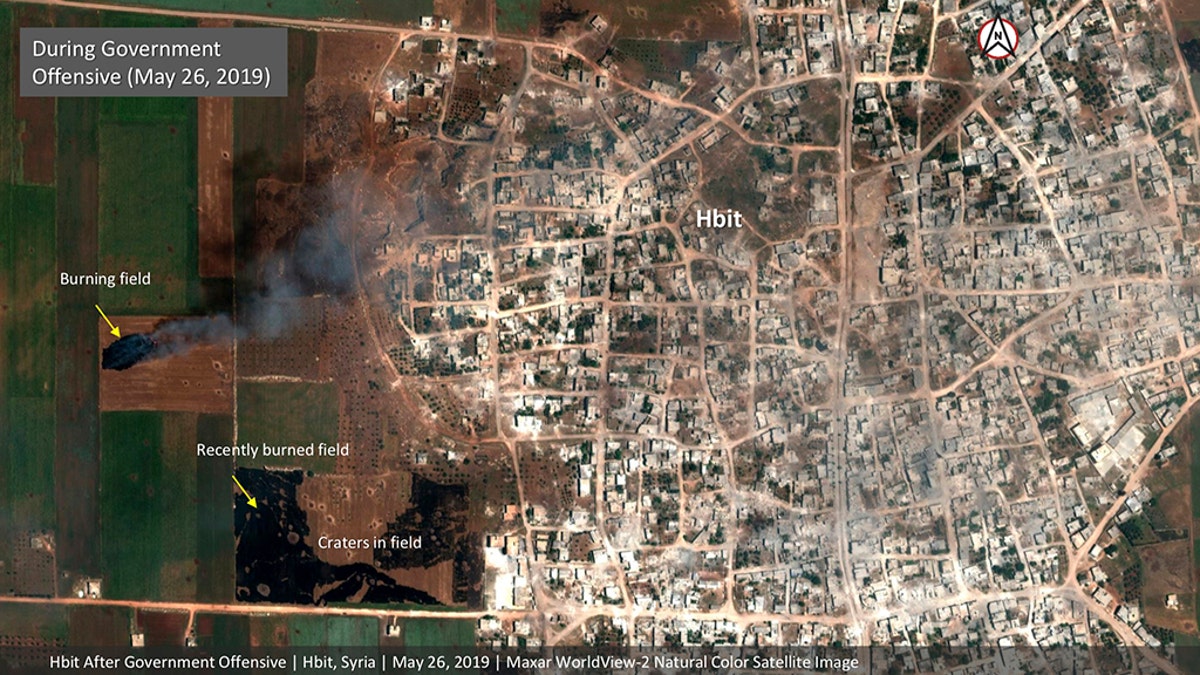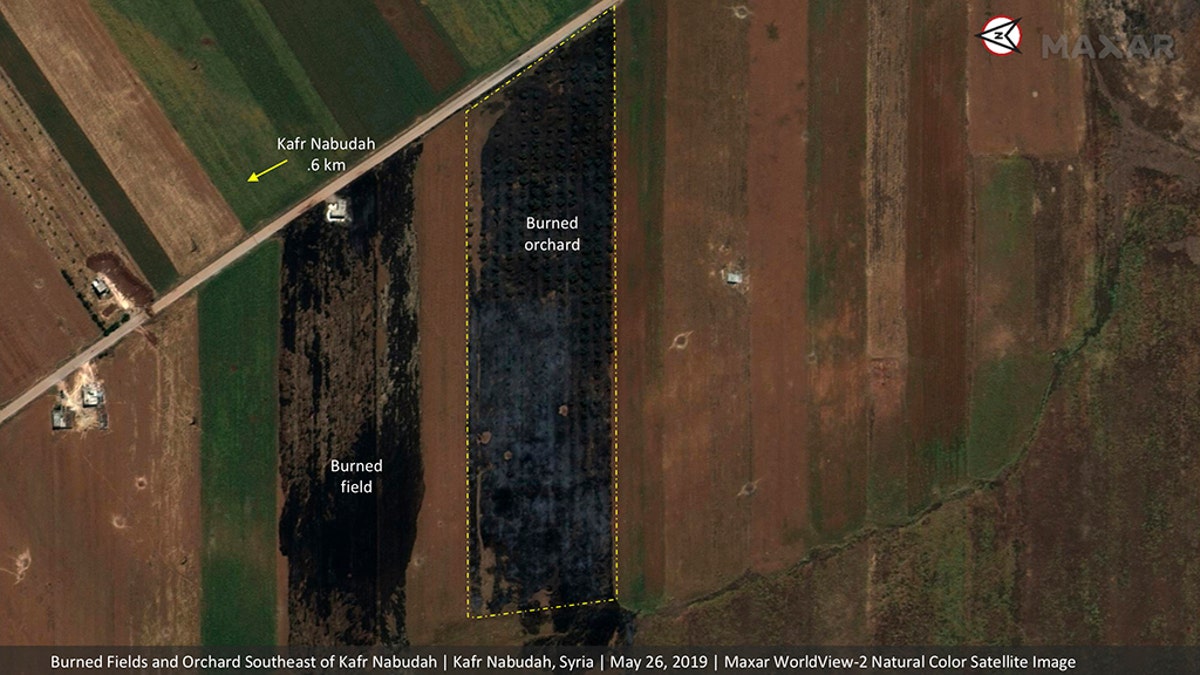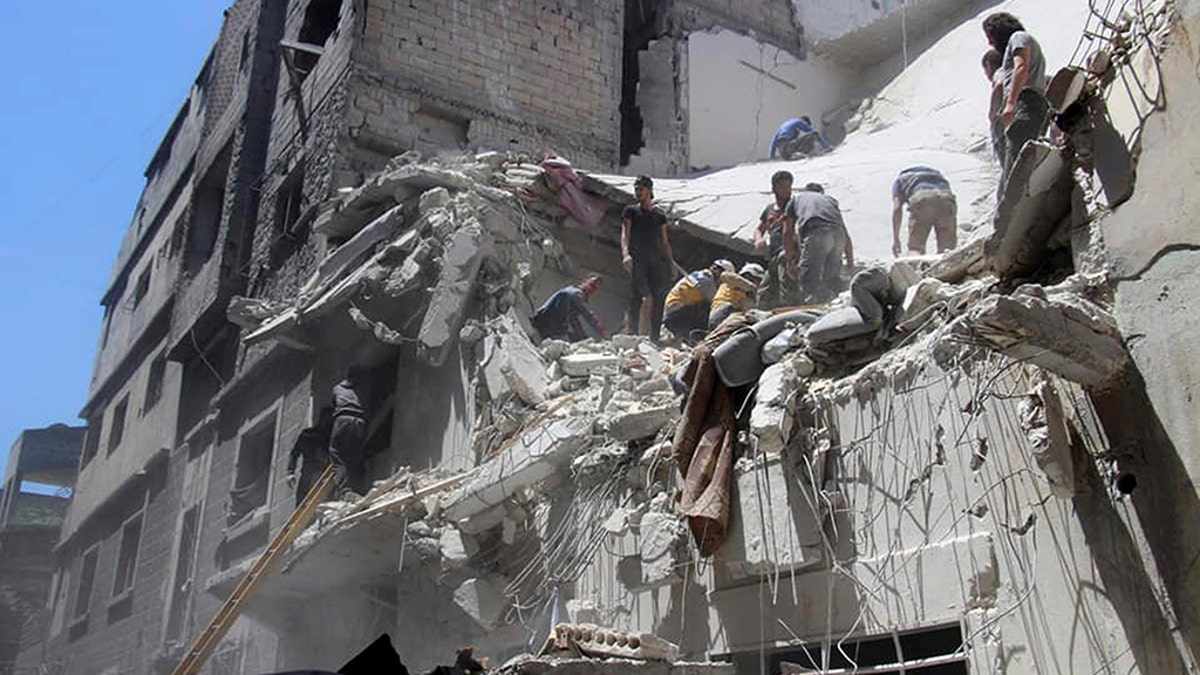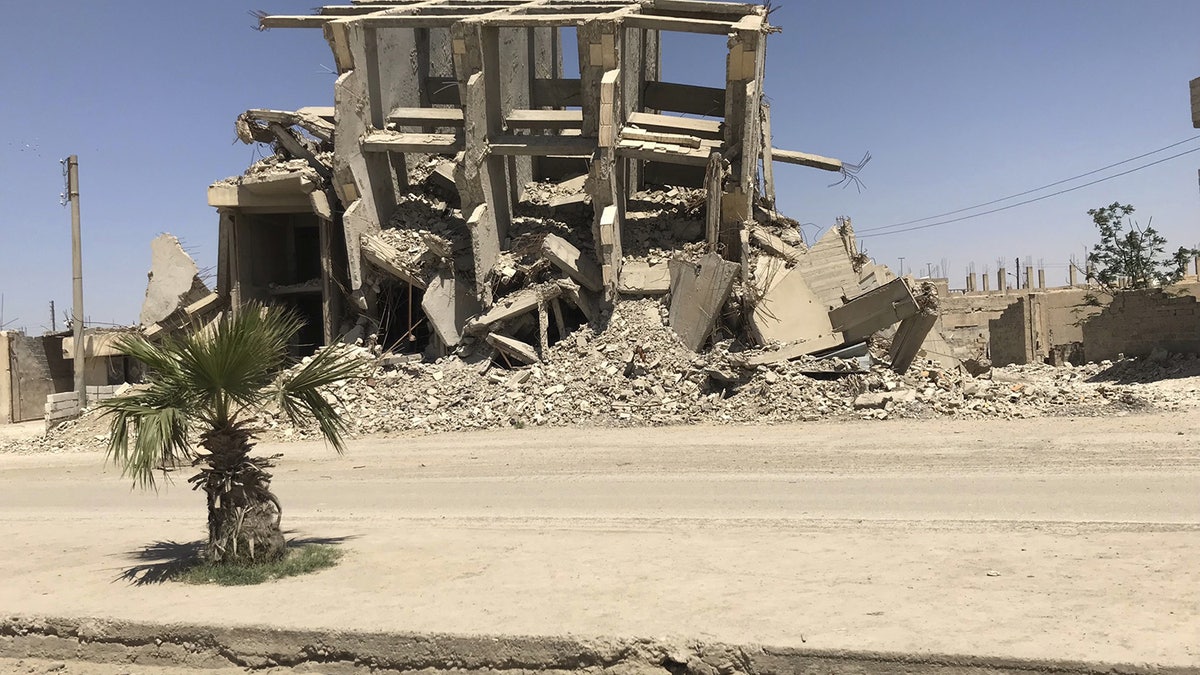State Department investigates suspected chlorine attack in Syria
Retired Adm. William McRaven says if Syria is using chemical weapons the U.S. military will take appropriate action.
The slivers that make what is left of Syria’s last rebel-held bastion have gone up in flames in recent days, with government planes destroying acres of farmland.
Satellite photos, released by the Colorado-based Maxar Satellites on Tuesday, showed fires ravaging olive groves and orchards and subsequently destroying vital crops including wheat and barley at the height of harvest seasons in the villages of Kfar Nabudah and Habeet on the periphery of Idlib province.
The Associated Press reported that Kfar Nabudah fell from opposition control and into the hands of Bashar al-Assad's regime Sunday, while the infernos were sparked from an acute bombing campaign nearby. The Syrian Observatory for Human Rights said Sunday marked the heaviest day of air strikes since launching a major campaign against the rebel-held territory almost one month ago.

This satellite image provided by Maxar Technologies on Tuesday, May 28, 2019 shows significant damage to Habeet, Syria on May 26 as a result of a government offensive against the last rebel stronghold in the country. The images, provided to the Associated Press by the Colorado-based Maxar Technologies show fire still raging in olive groves and orchards during harvest season around Kfar Nabudah and Habeet, two villages on the edge of Idlib province where fighting has focused. (Maxar Technologies via AP)
MEDICAL MIRACLES: CHILD BURN VICTIMS IN SYRIA BROUGHT TO US FOR LAST SHOT AT LIFE
One worker in the region, Abdul, told Fox News on Tuesday that the people in the region whose lands are on fire are people are very poor and just when they thought nothing more could be taken from them in the protracted war – it has.
“Many villages have been burned, and still now are burning. People had been waiting all year for their wheat and barley and for food and now it is just gone. They cannot go and collect what they worked for,” he said. “People are sad, even sadder. People thought they could try to help themselves, but that is gone.”
Abdul also stressed that there are still some harvest pockets not yet incinerated, but it may only be a waiting game.
“And there are some fires still burning and the fire trucks cannot reach them, because if the bomber planes see them they will strike,” he claimed.
Indeed for those left languishing in the last opposition-controlled pockets in the north of the blood-soaked nation, it is all something akin to a scorched earth policy that threatens the lives of more than three million stranded Syrian civilians.
“The government and the Russians are doing this to prevent the rebels from making progress,” one activist on the ground told Fox News. “They have bombed and continue to bomb. We are now in the harvest season. There are artillery shells, explosive barrels, burning the land and the people who are defending their property.”

This satellite image provided by Maxar Technologies on Tuesday, May 28, 2019 shows significant damage to fields and orchards south of Kfar Nabudah, Syria, on May 26 as a result of a government offensive against the last rebel stronghold in the country. (Maxar Technologies via AP)
Another in Idlib affirmed that the whole area is under bombardment by “all kinds of destructive and incendiary weapons,” and the missiles have in recent days caused fires due to a combination of crops that were ready to harvest and easier to ignite.
SYRIAN DOCTOR DESCRIBES LATEST ALLEGED CHEMICAL ATTACK AS US MULLS RESPONSE
However, one former Syrian official also told Fox News that some 200 miles west, ISIS too is continuing to unleash its reign of terror on locals trying to rebuild their lives in and around Raqqa, which was once deemed the extremist group’s “caliphate”.
“ISIS is doing the same thing in the SDF areas and in Iraq, on the same scale,” said the source.

This photo provided by the Syrian Civil Defense White Helmets, which has been authenticated based on its contents and other AP reporting, shows Civil Defense workers inspecting a damaged building after an airstrike by Syrian government forces, in the town of Ariha, in the northwestern province of Idlib, Syria, Monday, May 27, 2019. (Syrian Civil Defense White Helmets via AP)
The Raqqa Civilian council pegged the blame on ISIS sleeper cells last week, and the outfit quickly came forward to take credit. A pro-ISIS Telegram channel released a poster, as exposed by the Middle East Media Research Institute (MEMRI), praising the arson attacks in both Iraq and Syria urging others to follow suit.
“The economic depletion by the Islamic State on its enemies – of all religions and faiths – is in full force. This is in accordance with what Allah has stated: 'And if you punish [an enemy, oh believers], then punish them with the like of that with which you were afflicted,’” the supporters wrote. “This economic depletion of enemy resources will annihilate the enemy and its allied forces.”

Raqqa remains razed and in ruins more than seven months since liberation (Fox News/Hollie McKay)
The Raqqa Civil Council is said to have established a number of fire stations in rural areas, but there is an insufficient number of fire trucks available to contain the seemingly ceaseless blazes.
Meanwhile, residents whose lives have long been ripped apart by the protracted conflict are left to watch acres of wheat and barley conflagrate before their eyes – the quest of rebuilding their lives an even more distant dream.
"This is food for next year, this is our bread from next year," one young Syrian, Ziad, opined. "Now gone."









































